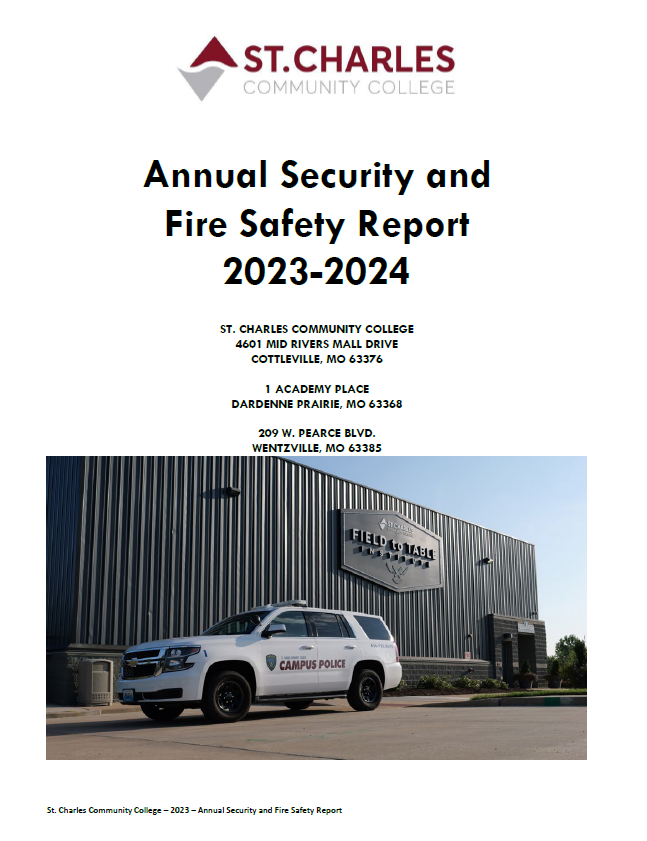There are numerous terms used by St. Charles Community College in our policy and procedures.
Consent as defined in Missouri Revised Statutes, Chapter 556 Preliminary Provisions (Criminal Code) Section 556.061 (5):
"Consent": consent or lack of consent may be expressed or implied. Assent does not constitute consent if:
(a) It is given by a person who lacks the mental capacity to authorize the conduct charged to constitute the offense and such mental incapacity is manifest or known to the actor; or
(b) It is given by a person who by reason of youth, mental disease or defect, intoxication, a drug-induced state, or any other reason is manifestly unable or known by the actor to be unable to make a reasonable judgment as to the nature or harmfulness of the conduct charged to constitute the offense; or
(c) It is induced by force, duress or deception;
SCC’s policy states in order for individuals to engage in sexual activity of any type with each other, there must be clear, knowing and voluntary consent prior to and during sexual activity. Consent can be given by word or action, but non-verbal consent is not as clear. Consent to some form of sexual activity cannot be automatically taken as consent to any other form of sexual activity. Consent must be freely given.
In order to give effective consent one must be of legal age and capable of making such decision. Assent does not constitute consent if: (a) it is given by a person who lacks the mental capacity to authorize the conduct charged to constitute the offense and such mental incapacity is manifest or known to the actor; or (b) it is given by a person who by reason of youth, mental disease or defect, incapacitation, a drug-induced state, or any other reason is manifestly unable or known by the actor to be unable to make a reasonable judgment as to the nature or harmfulness of the conduct charged to constitute the offense; or (c) it is induced by force, duress, or deception.
Sexual Assault: “Sexual assault” means an offense that meets the definition of rape, fondling, incest, or statutory rape as used in the FBI’s Uniform Crime Reporting system. A sex offense is any act directed against another person, without the consent of the victim, including instances where the victim is incapable of giving consent.
“Rape” is defined as the penetration, no matter how slight, of the vagina or anus with any body part or object, or oral penetration by a sex organ of another person, without the consent of the victim.
“Fondling” is defined as the touching of the private parts of another person for the purposes of sexual gratification, without the consent of the victim, including instances where the victim is incapable of giving consent because of his/her age or because of his/her temporary or permanent mental incapacity.
“Incest” is defined as non-forcible sexual intercourse between persons who are related to each other within the degrees wherein marriage is prohibited by law.
“Statutory Rape” is defined as non-forcible sexual intercourse with a person who is under the statutory age of consent. SCC’s policy states that Sexual Assault is actual or attempted physical sexual contact with another person without that person’s consent. Sexual assault includes, but is not limited to:
- Intentional touching of another person’s intimate parts without that person’s consent;
- Other intentional sexual contact with another person without that person’s consent;
- Coercing, forcing, or attempting to coerce or force a person to touch another person’s intimate parts without that person’s consent;
- Penetration, no matter how slight, of (1) the vagina or anus of a person by any body part of another person or by an object, or (2) the mouth of a person by a sex organ of another person, without that person’s consent;
- Non-forcible sexual intercourse between persons who are related to each other within the degrees wherein marriage is prohibited by law; or
- Non-forcible sexual intercourse with a person who is under the statutory age of consent.
In order for individuals to engage in sexual activity of any type with each other, there must be clear, knowing and voluntary consent prior to and during sexual activity. Consent can be given by word or action, but non-verbal consent is not as clear. Consent to some form of sexual activity cannot be automatically taken as consent to any other form of sexual activity. Consent must be freely given.
In order to give effective consent one must be of legal age and capable of making such decision. Assent does not constitute consent if: (a) it is given by a person who lacks the mental capacity to authorize the conduct charged to constitute the offense and such mental incapacity is manifest or known to the actor; or (b) it is given by a person who by reason of youth, mental disease or defect, incapacitation, a drug-induced state, or any other reason is manifestly unable or known by the actor to be unable to make a reasonable judgment as to the nature or harmfulness of the conduct charged to constitute the offense; or (c) it is induced by force, duress, or deception.
Domestic Violence: The term ‘‘domestic violence’’ means:
1) Felony or misdemeanor crimes of violence committed –
i. By a current or former spouse or intimate partner of the victim;
ii. By a person with whom the victim shares a child in common;
iii. By a person who is cohabitating with or has cohabitated with the victim as a spouse or intimate partner;
iv. By a person similarly situated to a spouse of the victim under the domestic or family violence law of the jurisdiction in which the crime of violence occurred; or
v. By any other person against an adult or youth victim who is protected from that person’s act under the domestic or family violence laws of the jurisdiction in which the crime of violence occurred.
2) For the purposes of complying with the requirements of this section and section 668.41, any incident meeting this definition is considered a crime for the purposes of Clery Act reporting.
Domestic Violence, as defined in Missouri Revised Statutes, Chapter 455 Abuse – Adults and Children – Shelters and Protective Orders Section 455.010: (5) “Domestic Violence”, abuse or stalking committed by a family or household member, as such terms are defined in section:
(1) "Abuse" includes but is not limited to the occurrence of any of the following acts, attempts or threats against a person who may be protected pursuant to this chapter, except abuse shall not include abuse inflicted on a child by accidental means by an adult household member or discipline of a child, including spanking, in a reasonable manner:
(a) "Assault", purposely or knowingly placing or attempting to place another in fear of physical harm;
(b) "Battery", purposely or knowingly causing physical harm to another with or without a deadly weapon;
(c) "Coercion", compelling another by force or threat of force to engage in conduct from which the latter has a right to abstain or to abstain from conduct in which the person has a right to engage;
(d) "Harassment", engaging in a purposeful or knowing course of conduct involving more than one incident that alarms or causes distress to an adult or child and serves no legitimate purpose. The course of conduct must be such as would cause a reasonable adult or child to suffer substantial emotional distress and must actually cause substantial emotional distress to the petitioner or child. Such conduct might include, but is not limited to:
a. Following another about in a public place or places
b. Peering in the window or lingering outside the residence of another; but does not include constitutionally protected activity
(e) "Sexual Assault", causing or attempting to cause another to engage involuntarily in any sexual act by force, threat of force, or duress
(f) "Unlawful Imprisonment", holding, confining, detaining or abducting another person against that person's will;
Dating Violence: The term ‘‘Dating Violence’’ means violence committed by a person –
1) Who is or has been in a social relationship of a romantic or intimate nature with the victim and
2) The existence of such a relationship shall be based on the reporting party’s statement and with consideration of the length of the relationship, the type of relationship, and the frequency of interaction between the persons involved in the relationship.
For the purposes of this definition –
(i) Dating Violence includes, but is not limited to, sexual or physical abuse or the threat of such abuse.
(ii) Dating Violence does not include acts covered under the definition of domestic violence.
For the purposes of complying with the requirements of this section and section 668.41, any incident meeting this definition is considered a crime for the purposes of Clery Act reporting.
Dating Violence is considered domestic violence under current Missouri (455.010(7) RSMo) in the definition for domestic assault based on the definition of “Family” or “Household Member”.
SCC’s policy states Dating Violence is violence committed by a person who is or has been in a social relationship of a romantic or intimate nature with the victim. The existence of such a relationship shall be based on the reporting party’s statement and with consideration of the length of the relationship, the type of relationship, and the frequency of interaction between the persons involved in the relationship. Dating violence includes, but is not limited to, sexual or physical abuse or the threat of such abuse. Dating violence does not include acts covered under the definition of domestic violence.
Stalking: The term “Stalking” means 1) Engaging in a course of conduct directed at a specific person that would cause a reasonable person to –
(i) Fear for the person’s safety or the safety of others; or
(ii) Suffer substantial emotional distress.
2) For the purposes of this definition –
(i) Course of conduct means two or more acts, including, but not limited to, acts which the stalker directly, indirectly, or through third parties, by any action, method, device, or means follows, monitors, observes, surveils, threatens, or communicates to or about, a person, or interferes with a person’s property.
(ii) Substantial emotional distress means significant mental suffering or anguish that may, but does not necessarily, require medical or other professional treatment or counseling.
(iii) Reasonable person means a reasonable person under similar circumstances and with similar identities to the victim.
3) For the purposes of complying with the requirements of this section and section 668.41, any incident meeting this definition is considered a crime for the purposes of Clery Act reporting.
SCC’s policy states Stalking is engaging in a course of conduct directed at a specific person that would cause a reasonable person to fear for her or his safety or the safety of others, or suffer substantial emotional distress.
For purposes of this definition:
- “Course of conduct” means two or more acts, including, but not limited to, acts which the stalker directly, indirectly, or through third parties, by any action, method, device, or means follows, monitors, observes, surveils, threatens, or communicates to or about, a person, or interferes with a person’s property;
- “Substantial emotional distress” means significant mental suffering or anguish that may, but does not necessarily, require medical or other professional treatment or counseling; and
- “Reasonable person” means a reasonable person under similar circumstances and with similar identities to the victim.










